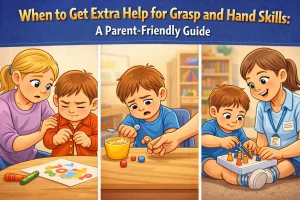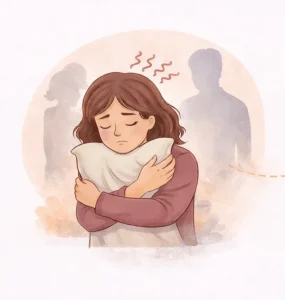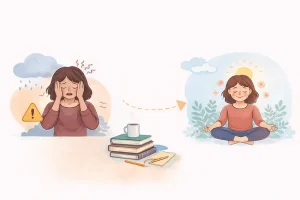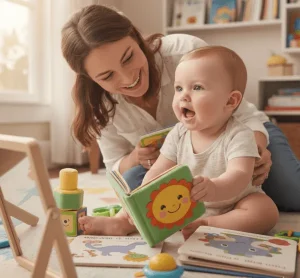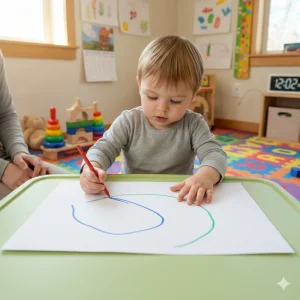Tips to Reduce Echolalia in Your 4-Year-Old
Last Updated: August 6, 2025
Have you ever noticed your 4-year-old repeating words or phrases they’ve just heard? This repetition is called echolalia. It’s a common part of language development, especially in young children. Echolalia happens when a child mimics what they hear, often without understanding the meaning. While it’s a normal stage in language learning, it can sometimes be a sign of underlying issues.
Book Free Autism Session
Concerned about your child’s development? Talk to our autism expert online for free. Get personalized consultation and expert next steps.
Explanation of Why It’s Common in 4-Year-Olds and When Parents Should Be Concerned
Echolalia is particularly common in 4-year-olds because this age is a critical period for speech and language development. Children at this stage are absorbing language rapidly and often repeat what they hear as a way to practice and learn. However, if echolalia persists beyond this age or is accompanied by other developmental concerns, it may be time to look deeper. Persistent echolalia can sometimes be linked to conditions like autism spectrum disorder (ASD) or other communication disorders.
Understanding Echolalia
Definition of Echolalia
Echolalia is when a child repeats words or phrases that they hear, often without understanding their meaning. This can include mimicking sounds, repeating sentences, or echoing entire conversations. It’s a natural part of language development in young children, but it can also be a sign of developmental disorders if it persists or is excessive.
Types of Echolalia: Immediate vs. Delayed
Echolalia comes in two main forms:
- Immediate Echolalia: This happens when a child repeats words or phrases right after hearing them. For example, if you say, “Do you want a cookie?” the child might immediately repeat, “Do you want a cookie?” This type of echolalia is often seen in younger children as they practice and learn language.
- Delayed Echolalia: This occurs when a child repeats something they’ve heard after a delay, which could be minutes, hours, or even days later. For instance, a child might quote a line from a favorite TV show they watched earlier. Delayed echolalia can be more challenging to understand because the context is not always clear.
Common Reasons Why Children Exhibit Echolalia
Several factors can contribute to echolalia in children:
- Language Learning: For many children, especially around the age of 4, echolalia is simply a part of learning to speak. They repeat words and phrases to practice and understand how language works.
- Autism Spectrum Disorder (ASD): Echolalia is common in children with autism. It can serve as a way for them to process language and communicate when they have difficulty generating their own speech.
- Communication Strategies: Some children use echolalia as a way to interact with others when they’re not sure how to respond. It can be a way to participate in conversations without having to come up with original speech.
- Behavioral Patterns: For some children, echolalia becomes a habit or a comfort mechanism. It can be soothing for them to repeat familiar sounds and phrases.
Common Signs of Echolalia
| Sign | Description |
|---|---|
| Immediate Repetition | The child repeats words or phrases immediately after hearing them. For example, if you say, “Do you want a cookie?” the child might instantly repeat, “Do you want a cookie?” without answering the question. |
| Delayed Repetition | The child repeats words or phrases after a delay of minutes, hours, or even days. For example, the child might quote a line from a TV show they watched the previous day. |
| Mimicking Speech | The child mimics speech without understanding its meaning or context. This might include repeating advertisements, jingles, or overheard conversations. |
| Repeating Phrases in Play | The child uses repeated phrases during play activities. For example, while playing with toys, the child might continuously repeat, “Let’s go to the park,” even when it’s not relevant to the play scenario. |
Tips to Reduce Echolalia
Model Appropriate Speech
One of the most effective ways to help your child reduce echolalia is to model appropriate speech. Here’s how:
- Demonstrate Clear and Simple Speech: Use short sentences and avoid complex language. This helps your child understand and imitate correct speech patterns.
- Rephrase Correctly: When your child repeats something, rephrase it correctly and encourage them to use the new phrase. For example, if they repeat, “Do you want a cookie?” you can respond, “Yes, I want a cookie. Can you say, ‘I want a cookie’?”
Read more: 10 Simple Ways to Support a Child with Echolalia
Increase Communication Opportunities
Creating more chances for your child to communicate can significantly reduce echolalia. Here are some strategies:
- Encourage Expression: Encourage your child to express their needs and wants. This can be done through simple prompts and everyday interactions.
- Use Everyday Situations: Use daily activities to prompt speech. For example, ask questions that require a choice or specific answer, such as “Do you want an apple or a banana?”
Use Visual Supports
Visual aids can be incredibly helpful in reducing echolalia by providing clear and understandable cues:
- Implement Visual Aids: Use pictures, charts, and flashcards to help your child understand and anticipate conversations.
- Daily Schedules: Using a daily schedule with pictures can explain routines and help your child know what to expect next.
Positive Reinforcement
Positive reinforcement can encourage your child to use spontaneous speech more often:
- Praise and Reward: Praise and reward your child’s attempts at spontaneous speech. Creating a supportive environment encourages more frequent communication.
- Small Rewards: Give small rewards or verbal praise when your child uses original speech. This reinforces their effort and progress.
Engage in Interactive Play
Interactive play is a fun and effective way to build language skills:
- Use Playtime: Use playtime to engage in activities that require verbal interaction. Role-playing games and storytelling with toys are great examples.
- Interactive Games: Engage in games that prompt your child to use language, helping them practice in a relaxed and enjoyable setting.
Teach Functional Language
Teaching your child functional language can make their speech more purposeful and reduce echolalia:
- Focus on Useful Phrases: Teach your child useful and relevant phrases that they can use in daily interactions.
- Practice Social Interactions: Practice common social interactions such as greetings, asking for help, and making requests. This helps your child learn to use language in real-life situations.
When to Seek Professional Help
Signs That Indicate the Need for Professional Evaluation
While echolalia can be a normal part of language development, certain signs may indicate the need for professional evaluation. If you notice any of the following, it may be time to consult a specialist:
- Persistence Beyond Age 4: If your child’s echolalia continues beyond the age of 4, it could signal an underlying issue.
- Lack of Functional Speech: If your child relies heavily on repeated phrases and struggles to use language functionally.
- Social and Communication Challenges: Difficulty in social interactions, limited eye contact, or a preference for solitary play.
- Regression in Language Skills: Any noticeable regression in language or social skills should be addressed promptly.
- Frustration and Behavioral Issues: Increased frustration due to difficulty in communicating, leading to behavioral problems.
Benefits of Early Intervention and Specialized Support
Seeking professional help early can make a significant difference in your child’s development. Here’s how early intervention and specialized support can benefit your child:
- Tailored Strategies: Professionals can develop personalized strategies to address your child’s specific needs, helping them to communicate more effectively.
- Skill Development: Early intervention programs can enhance your child’s language, social, and cognitive skills, setting a strong foundation for future development.
- Parental Guidance: Specialists can provide valuable guidance to parents, offering techniques and tools to support their child’s progress at home.
- Access to Resources: Professionals can connect you with resources and support networks, ensuring you have the necessary tools and information to help your child thrive.
- Improved Outcomes: Early and targeted support can lead to better long-term outcomes, improving your child’s ability to communicate and interact socially.
Know more: Early Identification/ Warning Signs in child development
Benefits of Early Intervention
| Benefit | Description |
|---|---|
| Tailored Strategies | Personalized strategies to address your child’s specific needs, ensuring effective intervention. |
| Skill Development | Enhanced language, social, and cognitive skills through targeted activities and therapies. |
| Parental Guidance | Techniques and tools for parents to support their child’s progress at home, fostering a supportive environment. |
| Access to Resources | Connection to valuable resources and support networks, providing comprehensive assistance for your child’s development. |
| Improved Outcomes | Better long-term outcomes for communication and social interaction, leading to more successful integration and independence. |
Conclusion
Addressing echolalia in your 4-year-old is crucial for their language development and overall communication skills. Understanding the reasons behind echolalia and using effective strategies can greatly improve your child’s ability to express themselves. By modeling appropriate speech, increasing communication opportunities, using visual supports, and engaging in interactive play, you can help reduce echolalia and foster better language use. Remember, each step forward is a positive development, and your patience and consistency are key.
With the right strategies and support, your child can make significant progress in reducing echolalia and improving their communication skills. Early intervention and specialized support, such as those offered by Wellness Hub, can provide tailored guidance and resources to assist you. Stay committed to the techniques discussed, and seek professional help if needed. Your dedication will help your child thrive. For more information and resources, visit Wellness Hub. Thank you for trusting us as your partner in your child’s development.
Frequently Asked Questions:
1. What is echolalia in children?
Echolalia is when a child repeats words or phrases they hear, often without understanding their meaning. It is a normal part of language development but can sometimes indicate underlying issues.
2. Why do 4-year-olds exhibit echolalia?
Echolalia is common in 4-year-olds as they practice and learn language. Repetition helps them understand and use new words and phrases. It can also be linked to conditions like autism if it persists.
3. How can I reduce echolalia in my 4-year-old?
You can reduce echolalia by modeling appropriate speech, increasing communication opportunities, using visual supports, giving positive reinforcement, engaging in interactive play, and teaching functional language.
4. When should I be concerned about echolalia in my child?
If echolalia persists beyond age 4, or if your child struggles with functional speech and social interactions, it may be time to seek professional evaluation.
5. What are the benefits of early intervention for echolalia?
Early intervention provides tailored strategies, enhances language and social skills, offers parental guidance, connects you with resources, and improves long-term outcomes for your child.
6. Can echolalia be a sign of autism?
Yes, echolalia can be a sign of autism spectrum disorder (ASD). Children with ASD may use echolalia as a way to process language and communicate.
7. What professional help is available for echolalia?
Speech therapists and early intervention programs can offer specialized support and strategies to help your child reduce echolalia and improve their communication skills.
8. How can visual supports help with echolalia?
Visual supports like pictures, charts, and flashcards can help your child understand and anticipate conversations, making it easier for them to use language appropriately.
9. What role does interactive play have in reducing echolalia?
Interactive play helps build language skills by engaging your child in activities that require verbal interaction, such as role-playing games and storytelling.
10. How important is consistency in addressing echolalia?
Consistency is crucial. Regularly using the strategies and techniques discussed can help your child make steady progress in reducing echolalia and improving their communication skills.
About the Author:
Shilpa Deshpande
Shilpa Deshpande is a skilled speech-language pathologist with over 14 years of experience. Fluent in Kannada, Telugu, Hindi, and English, she specializes in parent counseling, speech sound disorders, fluency assessment, and speech-language evaluations. Shilpa excels at working with children with developmental disorders, offering creative and effective therapy programs. Currently, at Wellness Hub, she holds a BASLP degree and is registered with the RCI. Her patience, ambition, and dedication make her a trusted expert in her field.
Book your Free Consultation Today
Parent/Caregiver Info:
Client’s Details:
* Error Message
